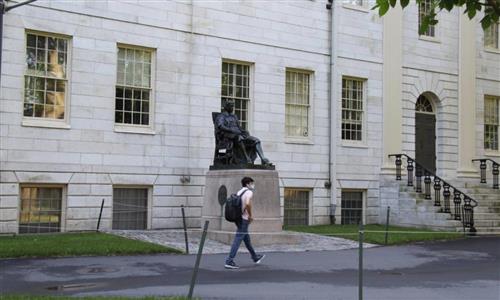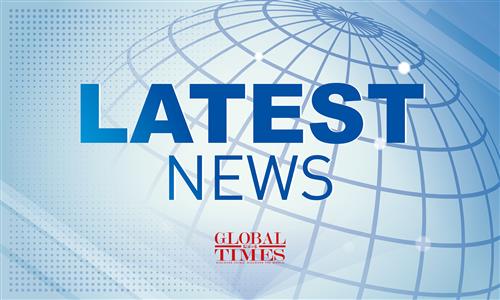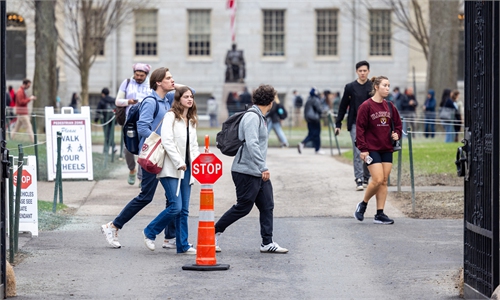US judge blocks Trump’s proclamation to suspend new intl student visas at Harvard, ‘tension likely to resolved via judicial means’

People walk in Harvard Yard at Harvard University on April 15, 2025, in Cambridge, Massachusetts. Photo: AFP
The latest development in the dispute between Harvard University and the US government saw a federal judge temporarily block President Donald Trump administration's ban on entry of international Harvard students, with a Chinese expert saying that the tension between the two sides might be resolved through judicial means, likely by appealing to the Supreme Court.
A federal judge in Boston on Thursday temporarily blocked Trump from barring US entry of foreign nationals seeking to study or participate in exchange programs at Harvard University, according to a Reuters report on Thursday.
Under a two-page temporary restraining order granted to Harvard, US District Judge Allison Burroughs enjoined Trump's proclamation from taking effect pending further litigation of the matter amid an escalating dispute with the Ivy League school, Reuters said.
Based on a White House statement on Wednesday, Trump's proclamation directed the Secretary of State "to consider revoking" visas — F, M, and J categories — for current Harvard students who meet the proclamation's "criteria."
The temporary restraining order comes hours after the university urged the judge to step in on an emergency basis to block the proclamation Trump signed a day earlier, CNN reported.
Sun Chenghao, a research fellow at Tsinghua University's Center for International Security and Strategy, told the Global Times that the issue may ultimately have to be resolved through judicial means, likely by appealing to the Supreme Court. Although the final ruling is unpredictable, a judicial resolution would be inevitable and the core issue lies in defining the boundaries of presidential executive power.
International students provide significant financial and intellectual support to American colleges and universities like Harvard. Such policy uncertainty could not only disrupt academic exchange across the education sector in the US, but also prompt international students to consider alternative destinations, the expert continued.
If Trump's measure were to survive this court challenge, it would block thousands of students who are scheduled to come to Harvard's campus in Cambridge, Massachusetts, for the summer and fall terms, NPR reported on Friday.
Harvard University said in the amended complaint that "with the stroke of a pen, the DHS Secretary and the President have sought to erase a quarter of Harvard's student body, international students who contribute significantly to the University and its mission and the country." The school said, "Without its international students, Harvard is not Harvard."
Chinese students also face growing uncertainty following a series of US announcements restricting visas for them. Lin Jiang (pseudonym), a PhD student in economics at a university in the US Midwest, told the Global Times that several of her friends pursuing doctoral degrees in computer science, electrical and computer engineering, and biomedical engineering had planned to return to China to renew their expired visas. However, amid recent policy shifts, many now feel anxious and are hesitant to leave the country.
When asked to comment on the proclamation, Chinese Foreign Ministry spokesperson Lin Jian said on Thursday that what the US did will damage its own image and reputation. "We will firmly defend the legitimate and lawful rights and interests of Chinese students and scholars," he said.



